Jiro Dreams of Sushi Blu-ray Movie
HomeJiro Dreams of Sushi Blu-ray Movie 
Magnolia Pictures | 2011 | 81 min | Rated PG | Jul 24, 2012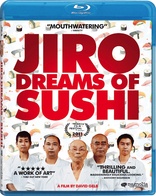
Movie rating
7.8 | / 10 |
Blu-ray rating
| Users | 4.5 | |
| Reviewer | 4.0 | |
| Overall | 4.0 |
Overview
Jiro Dreams of Sushi (2011)
The story of 85-year-old Jiro Ono, considered by many to be the best sushi chef in the world. A thoughtful and elegant meditation on work, family, and the art of perfection, chronicling Jiro's life as both an unparalleled success in the culinary world and as a loving yet complicated father.
Director: David Gelb| Foreign | Uncertain |
| Documentary | Uncertain |
Specifications
Video
Video codec: MPEG-4 AVC
Video resolution: 1080p
Aspect ratio: 1.78:1
Original aspect ratio: 1.78:1
Audio
Japanese: DTS-HD Master Audio 5.1
Subtitles
English, English SDH, Spanish
Discs
25GB Blu-ray Disc
Single disc (1 BD)
Playback
Region A (locked)
Review
Rating summary
| Movie | 4.0 | |
| Video | 3.5 | |
| Audio | 3.5 | |
| Extras | 2.5 | |
| Overall | 4.0 |
Jiro Dreams of Sushi Blu-ray Movie Review
Oishii desu yo!
Reviewed by Casey Broadwater July 20, 2012The closest I got to seafood as a kid was Gordon's fishsticks, so my palette has never been particularly accustomed to the ocean's briny delicacies. The
first time I had sushi, I thought it tasted like something pulled out of a drowned sailor's stomach. My gag reflex hit hard. I've been told this is an
atypical experience, and that perhaps I was at a less-reputable sushi joint, with less-than-fresh fare, but the damage was done—raw fish is one of
those foods I studiously avoid. Even during the two years I spent teaching English in Japan, living practically right on the Pacific coast, I couldn't bring
myself to try it again. After seeing Jiro Dreams of Sushi, however, I might be persuaded to give it another go.
The documentary is the debut feature by director David Gelb, who initially set out to make a broad film about the sushi craft in Tokyo—profiling several
restaurants and chefs—but found that everything he wanted to say about the industry is personified in one man, 85-year-old Jiro Ono, whom many
consider the best sushi chef in the world. Japan recently declared him a “living national treasure.” His restaurant has been awarded three Michelin
stars. Anthony Bourdain and French culinary legend Joël Robuchon are big fans. With a steely dedication to his lifelong craft, Jiro is what’s known in
Japan as a shokunin, a word that literally translates as “artisan,” but carriers deeper, meditative connotations. For our purposes, it might
simply mean master.
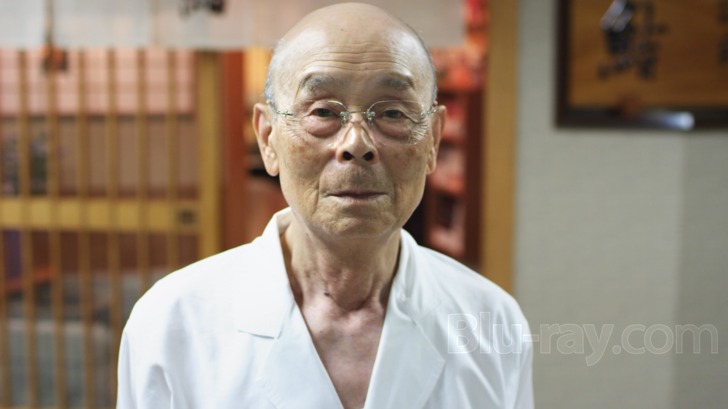
Jiro Ono
From outward appearances alone, you’d never expect a three-star dining experience from Sukiyabashi Jiro, Ono’s restaurant, which is tucked into the basement of a nondescript office building in Ginza, Tokyo’s premiere shopping district. The counter only seats ten, and reservations must be booked at least one month in advance. The price for the set menu—which consists of twenty hand-formed pieces of nigirizushi, served one after another in a concerto-like progression of flavors—starts at ¥30,000, about $380. A typical meal lasts less than twenty minutes. There are no appetizers. No frills. Jiro does sushi, and only sushi.
The elegance is in the simplicity, an aesthetic the film mirrors in its careful editing and exquisite cinematography. On one level, Jiro Dreams of Sushi is Grade-A food porn, with slo-mo preparation montages set to Beethoven and Bach and Philip Glass, shots of flashing knives making precise slices, and delicious close-ups of the glistening nigiri pieces as they leave Jiro’s hand and touch down briefly—they have to be eaten immediately—on the black, rectangular laquerware plates that are the minimalist restaurant’s sole concession to place settings. We learn that, when it comes to tuna, the leaner the cut, the more subtle and sophisticated the taste—a description that can apply to Jiro’s working ethos and sparse preparation style on the whole. There are no extraneous ingredients or steps. His routine is pared down to the point of perfection.
He’s been at it for seventy-five years, since he was abandoned by his father as a nine-year-old and forced to work just to survive. That sense of “Greatest Generation” WWII-era discipline? Japan’s elderly have it too, and Jiro is a prime example. He doesn’t like holidays because the downtime lasts too long. When he was presented with the Kakko Nintei “living treasure” certificate, he took the morning off but was back at the restaurant for dinner prep. “You must immerse yourself in your work; you must fall in love with your work; you must dedicate your life to mastering your skill,” he says. “That's the secret to success and the key to being regarded honorably.” Jiro stands in noted contrast to the country’s dwindling workforce of young people, who have come to expect the rewards of a good career—high salary, vacation time, flexibility—without exerting the effort.
Working at Sukiyabashi Jiro, we quickly gather, is a throwback to the grueling, apprenticeship-style employment that used to be much more widespread in Japan, with Jiro doling out his hard-earned knowledge through discipline and repetition. Members of the kitchen staff train for ten years or more to be considered first-rate. Daisuke Nakazawa, one of Jiro’s senior assistants, describes the difficulty of learning how to make egg sushi—a kind of uber-precise omelet—admitting how he cried with joy when he finally got it right and earned Jiro’s praise. The goal is for the work to become its own reward.
Jiro is hardest on his own two sons. The youngest, Takishi, operates a two-star-rated spin-off restaurant in Roppongi Hills, while his older brother, 50- year-old Yoshikazu, waits patiently for Jiro to retire so that he can take over the Ginza shop. As good a sous chef as Yoshikazu is—and we find out that it was actually he who prepared the sushi for the anonymous Michelin inspector—it’ll be tough for him to establish his own reputation outside of his dad’s shadow. There’s no doubt that he’s proud to carry on Jiro’s legacy, but there’s a hint of piquant melancholy here too, a sharp wasabi-like note of fatalism at the base of their father/son dynamic. Could the path of Yoshikazu’s life been otherwise? It’s doubtful. Jiro “allowed” his sons to finish high school—in his own words—but he convinced them both to skip college and follow the family trade. This backstory, with its emotional subtleties and sense of disappearing cultural tradition, takes what might’ve otherwise been a straightforward, nicely prepared food documentary and makes it into a satisfying cinematic meal. My compliments to the chef.
Jiro Dreams of Sushi Blu-ray Movie, Video Quality 
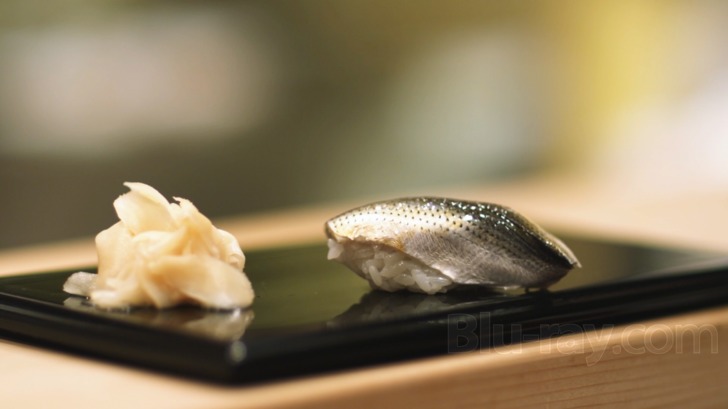
For the sake of being discrete, director David Gelb shot much of his initial footage with a small DSLR, eventually graduating to the larger and more capable Red One camera once he'd established Jiro's trust. There is a slight but noticeable gap in picture quality between the two sources, with the DSLR material more subject to compression artifacts and low-light noise. You'll also notice that highlights frequently seem a bit blown out, as if the exposure should've been dialed down an f-stop or two, but otherwise, there are no real distractions here. Color is strictly realistic, and peaked highlights aside, the image looks great, with satisfyingly deep blacks and balanced skin tones. And although the shallow, open-apertured depth of field results in some occasional softness from misplaced focus, clarity is strong enough to make you appreciate the fact that you're watching the film in high definition—via a 1080p/AVC encode—and not on DVD. It looks to me like Magnolia's Blu-ray presentation is entirely faithful to source.
Jiro Dreams of Sushi Blu-ray Movie, Audio Quality 
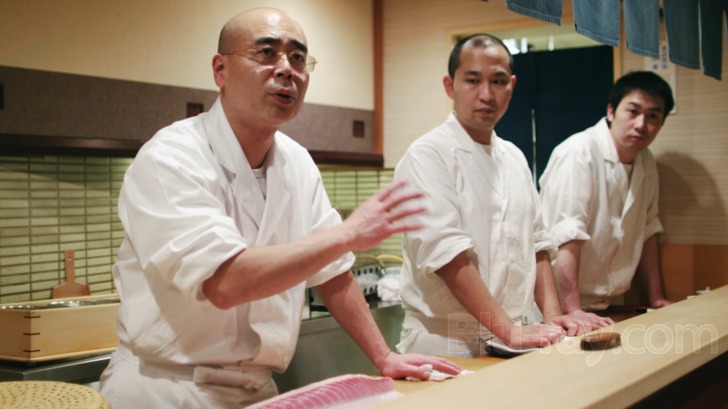
The disc includes a lossless DTS-HD Master Audio 5.1 surround track, and at risk of stating the obvious, yes, the entirety of the documentary is in Japanese. Since all of the audio was recorded on location, there are times when the voices can sound a bit thick or muddy, and you might notice a slight high-gain hiss on occasion, but none of this ever goes to the level of distraction or unintelligibility. For the most part, this mix does exactly what it needs to do. As you probably expect, most of the activity is constrained up front, but the rear channels do occasional get to put out some quiet ambience—like the lapping of ocean waves—and give some bleeding room to the musical cues. One of the highlights of the film is its elegant soundtrack selections, from Phillip Glass to Tchaikovsky to Bach, and it all sounds wonderful. The disc defaults to English subs, but those who might need or want them can also select English SDH or Spanish subtitle tracks.
Jiro Dreams of Sushi Blu-ray Movie, Special Features and Extras 
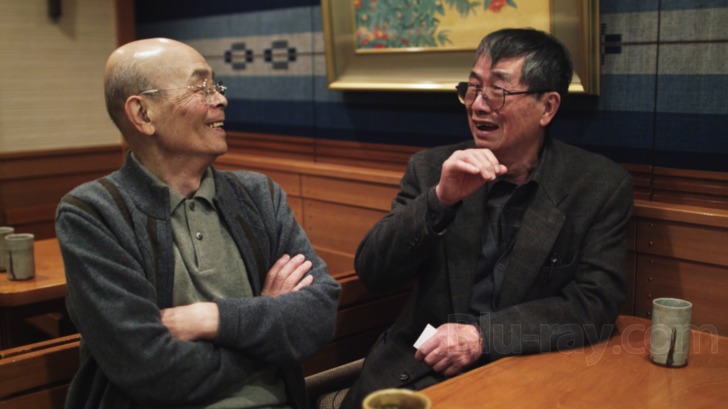
- Audio Commentary: Director/Producer David Gelb sits down with his editor, Brandon Driscoll-Luttringer, to discuss the making of the film, from the initial concept of a broad sushi overview to the process of piecing the documentary together in editing.
- Deleted Scenes (1080p, 20:50): Ten additional scenes, from the food writer describing his first experience at Jiro's to importance of cleanup, the ideal shape of sushi, and additional interviews with Jiro's apprentices.
- Masters (1080p, 19:11): Additional scenes with the tuna and shrimp "masters" from the Tsukiji Fish Market.
- Sushi Gallery (1080p, 2:07): A self-playing gallery of Jiro's dishes.
- Theatrical Trailer (1080p, 2:08)
- Also from Magnolia Home Entertainment (1080p, 1:56)
Jiro Dreams of Sushi Blu-ray Movie, Overall Score and Recommendation 
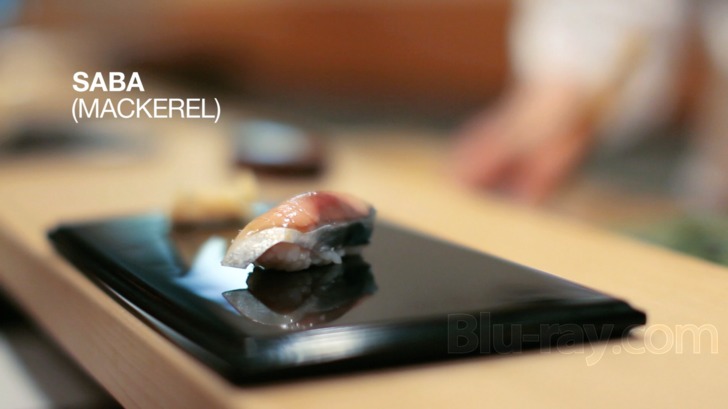
Although it's certainly one of the best documentaries I've ever seen about food in the past few years, Jiro Dreams of Sushi is more than that; it's about fathers and sons—looming shadows and unfillable shoes—and it explores a kind of dedication-to-craft that's hard to come by anymore in any industry. The film itself is as exquisite and artfully arranged as Jiro's minimalist sushi, with a wonderful soundtrack, beautiful macro cinematography, and a smart, spare editing style. If you love fine cuisine or if you're fascinated by individuals who make an art of the seemingly commonplace, you owe it to yourself to see it. Besides some unavoidable source-related picture quality hiccups, Magnolia's Blu-ray release is solid all around, and includes plenty of delicious extras. Highly recommended!
Similar titles
Similar titles you might also like

Kedi
Nine Lives: Cats in Istanbul
2016

Faces Places
Visages villages
2017

After the Storm
海よりもまだ深く / Umi yori mo mada fukaku
2016

Tokyo Olympiad
東京オリンピック / Tôkyô orinpikku
1965

Dodes'ka-den
どですかでん / Dodesukaden
1970

There Was a Father
父ありき
1942

Like Father, Like Son
2013

Triumph of the Will
Special Edition | Triumph des Willens
1935

The Dark Glow of the Mountains
1985

Herdsmen of the Sun
1989

Anselm 3D
Anselm - Das Rauschen der Zeit
2023

Agnès de ci de là Varda
Agnès Varda: From Here to There
2011

The World of Jacques Demy
L'univers de Jacques Demy
1995

The Gleaners and I: Two Years Later
Les glaneurs et la glaneuse... deux ans après
2002

Daguerréotypes
1976

Chronicle of a Summer
Chronique d'un été
1961

The Gleaners and I
Les glaneurs et la glaneuse
2000

America as Seen by a Frenchman
L' Amérique insolite
1960

Land of Silence and Darkness
Land des Schweigens und der Dunkelheit
1971

My Journey Through French Cinema
Voyage à travers le cinéma français
2016